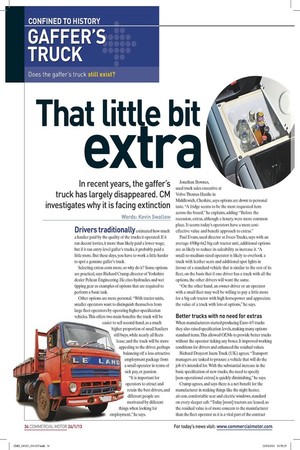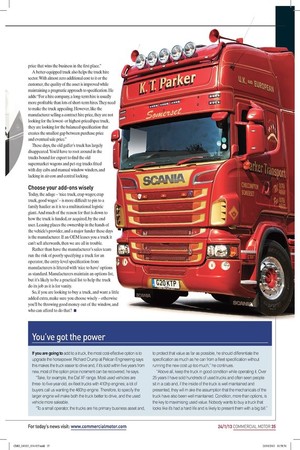That little bit extra
Page 28

Page 29

If you've noticed an error in this article please click here to report it so we can fix it.
In recent years, the gaffer's truck has largely disappeared. CM investigates why it is facing extinction Words: Kevin Swallow Drivers traditionally estimated how much a haulier paid by the quality of the trucks it operated. If it ran decent lorries, it more than likely paid a lower wage; but if it ran entry-level gaffer's trucks, it probably paid a little more. But these days, you have to work a little harder to spot a genuine gaffer's truck.
Selecting extras costs more, so why do it? Some options are practical, says Richard Crump, director of Yorkshire dealer Pelican Engineering. He cites hydraulics and wet tipping gear as examples of options that are required to perform a basic task.
Other options are more personal. "With tractor units, smaller operators want to distinguish themselves from large fleet operators by operating higher-specification vehicles. This offers two main benefits: the truck will be easier to sell second-hand, as a much higher proportion of small hauliers still buys, while nearly all fleets lease; and the truck will be more appealing to the driver, perhaps balancing off a less-attractive employment package from a small operator in terms of sick pay, or pension.
"It is important for operators to attract and retain the best drivers, and different people are motivated by different things when looking for employment," he says.
Jonathan Bownes, used truck sales executive at Volvo Thomas Hardie in Middlewich, Cheshire, says options are down to personal taste. "A fridge seems to be the most requested item across the board," he explains, adding: "Before the recession, extras, although a luxury, were more common place. It seems today's operators have a more costeffective value and benefit approach to extras."
Paul Evans, used director at Iveco Trucks, says with an average 450hp 6x2 big cab tractor unit, additional options are as likely to reduce its saleability as increase it. "A small-to-medium-sized operator is likely to overlook a truck with leather seats and additional spot lights in favour of a standard vehicle that is similar to the rest of its fleet, on the basis that if one driver has a truck with all the options, the other drivers will want the same.
"On the other hand, an owner-driver or an operator with a small fleet may well be willing to pay a little more for a big cab tractor with high horsepower and appreciate the value of a truck with lots of options," he says.
Better trucks with no need for extras When manufacturers started producing Euro-4/5 trucks they also raised specification levels, making many options standard items. This allowed OEMs to provide better trucks without the operator ticking any boxes. It improved working conditions for drivers and enhanced the residual values.
Richard Draycott Isuzu Truck (UK) agrees. "Transport managers are tasked to procure a vehicle that will do the job it's intended for. With the substantial increase in the basic specification of new trucks, the need to specify [non-operational extras] is quickly diminishing," he says.
Crump agrees, and says there is a net benefit for the manufacturer in making things like the night heater, air-con, comfortable seat and electric windows, standard on every sleeper cab. "Today [most] tractors are leased, so the residual value is of more concern to the manufacturer than the fleet operator as it is a vital part of the contract price that wins the business in the first place."
A better-equipped truck also helps the truck hire sector. With almost zero additional cost to it or the customer, the quality of the asset is improved while maintaining a pragmatic approach to specification. He adds: "For a hire company, a long-term hire is usually more profitable than lots of short-term hires. They need to make the truck appealing However, like the manufacturer selling a contract hire price, they are not looking for the lowestor highest-priced/spec truck, they are looking for the balanced specification that creates the smallest gap between purchase price and eventual sale price."
These days, the old gaffer's truck has largely disappeared. You'd have to root around in the trucks bound for export to find the old supermarket wagons and pet-reg trucks fitted with day cabs and manual window winders, and lacking in air-con and central locking.
Choose your add-ons wisely Today, the adage — 'nice truck, crap wages; crap truck, good wages' — is more difficult to pin to a family haulier as it is to a multinational logistic giant. And much of the reason for that is down to how the truck is funded, or acquired, by the end user. Leasing places the ownership in the hands of the vehicle's provider, and a major funder these days is the manufacturer. If an OEM leases you a truck it can't sell afterwards, then we are all in trouble.
Rather than have the manufacturer's sales team run the risk of poorly specifying a truck for an operator, the entry-level specification from manufacturers is littered with 'nice to have' options as standard. Manufacturers maintain an options list, but it's likely to be a practical list to help the truck do its job as it is for vanity.
So, if you are looking to buy a truck, and want a little added extra, make sure you choose wisely — otherwise you'll be throwing good money out of the window, and who can afford to do that? • You've got the power If you are going to add to a truck, the most cost-effective option is to upgrade the horsepower. Richard Crump at Pelican Engineering says this makes the truck easier to drive and, if it's sold within five years from new, most of the option price increment can be recovered, he says.
"Take, for example, the Daf XF range. Most used vehicles are threeto five-year-old, ex-fleet trucks with 410hp engines; a lot of buyers call us wanting the 460hp engine. Therefore, to specify the larger engine will make both the truck better to drive, and the used vehicle more saleable.
"To a small operator, the trucks are his primary business asset and, to protect that value as far as possible, he should differentiate the specification as much as he can from a fleet specification without running the new cost up too much," he continues.
"Above all, keep the truck in good condition while operating it. Over 25 years I have sold hundreds of used trucks and often seen people sit in a cab and, if the inside of the truck is well maintained and presented, they will m ake the assumption that the mechanicals of the truck have also been well maintained. Condition, more than options, is the key to maximising used value. Nobody wants to buy a truck that looks like it's had a hard life and is likely to present them with a big bill."










































